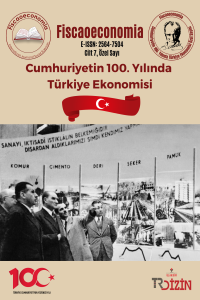Türkiye Ekonomisinde 1946 İktisadi Dönüşümünü Hazırlayan İçsel Dinamikler
Internal Dynamics that Prepared the 1946 Economic Transformation in the Turkish Economy
Author(s): Ozan Aras, Ebru IşikSubject(s): National Economy, Economic history, Recent History (1900 till today), WW II and following years (1940 - 1949)
Published by: Ahmet Arif Eren
Keywords: Turkish Economy; Turkish Economic History; Economic Sociology;
Summary/Abstract: In 1946, the Turkish economy, in conjunction with a devaluation, transformed the previously implemented statist economic policies and turned towards liberal policies compared to the previous period. This transformation was influenced not only by the global economic and political developments following the Second World War but also by the intrinsic dynamics of the Turkish economy. The post-war liberalisation and globalisation trends and the policies implemented for the reconstruction of Europe formed the basis of the transformation of the Western Bloc economies led by the United States of America (USA). However, the areas of conflict that had been present in the Turkish economy since its foundation, which deepened during the era of etatism and the Second World War, can be considered important internal factors behind the 1946 transformation. The principal aim of this study is to examine the internal reasons for the 1946 transformation in the Turkish economy within the context of the implemented economic policies and the relationship between the state and the capitalist circles. Therefore, rather than extensively delving into the external factors that create the transformation, the focus primarily rests on the internal dynamics arising from the state's approach to the economy. The adverse effects of the statist industrialization model on the capitalist circles deepened further during the War period, and the limitations of the statist industrialization model, particularly concerning investment and intermediate goods production, led to heightened reactions against statist policies from all sectors of the economy after the War. This, in turn, resulted in relatively more liberal principles within the capitalist circles and demands for integration into the global economy.
Journal: Fiscaoeconomia
- Issue Year: 7/2023
- Issue No: spec. 1
- Page Range: 239-259
- Page Count: 21
- Language: Turkish

